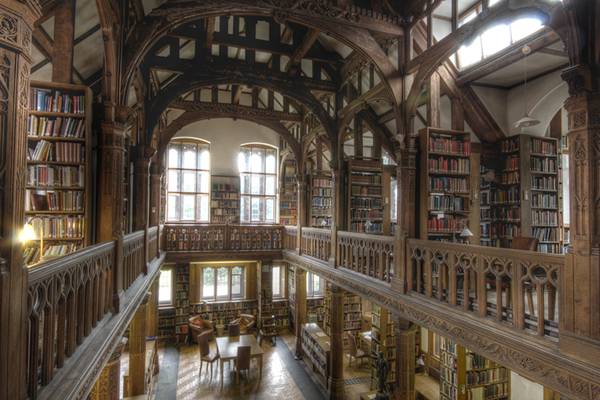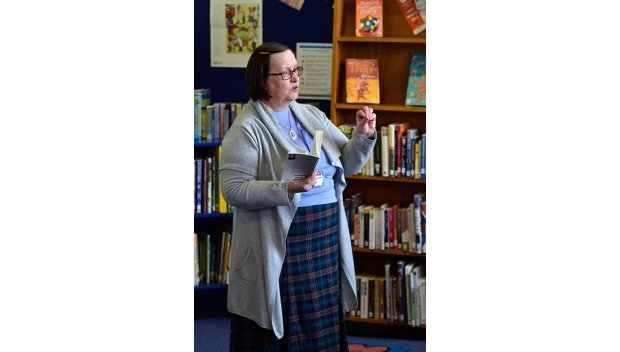I was born and raised in Widnes into a working class family. Books were very expensive, but I had an insatiable appetite for stories, and taught myself to read pre-school because I knew that would give me an unlimited amount of stories. My mother (who was a great storyteller) took me into the local library – I signed up for my card immediately, and our visits to change books were usually bi-weekly. Widnes library was then, and still is, a vast and wonderful place with two floors and seemingly endless books.
By the time I was in junior school I could take myself there, and was rapt in wonder at Storytime every Thursday, when the children’s librarian would read to us, carting home the maximum amount of books allowed, changing my books twice a week, helping out in the children’s library.
At 12 I graduated to the adult library. For one glorious year I had 12 tickets for the children’s library and 12 for the adult library, until someone noticed. I discovered many of my favourite poets on those shelves and had a folder where I would copy out poems that I could not live without. I still have those handwritten poems. The poets include Robert Graves, Elizabeth Jennings, R.S Thomas, Edward Thomas, Rupert Brooke, Wilfred Owen. I used to rummage around in all the rooms, and found Robert Graves’ The White Goddess, a text which made me decide, at the age of 15, to dedicate my life to being a poet. There were many other interesting discoveries from my delving. No-one directed my reading so I roamed free.
During my grammar school years I used to do my homework in the reference section in the upper gallery. I love the upper galleries at Gladstone’s because they remind me of those days: one can work in a lofty nest surrounded by books but can see the comings and goings below.
When I was at Liverpool University doing my first two degrees, I had access to five libraries! My favourite university library was the Harold Cohen, before they built the arts library. I rarely worked at the desks, but sat on the floor in the stacks with a pile of books to look at, often unrelated to my discipline. I had a big gap between English and Classical Civilisation lectures, and most of my friends did not, so I spent many happy times in the library. Liverpool Central library was equally wonderful. When I first entered the great dome of the Picton Library, I felt I’d had a glimpse of heaven.
So coming to Gladstone’s has been like coming home, in a way. I have built up a vast amount of books at home, far too many for a private house, perhaps because I needed to own all the books I wanted as a child. In a way, I am coming full circle: as I thin out my books at home, releasing them back into the world to find other readers, I will be borrowing again. I can see how Gladstone might have felt, bringing his precious books here to this magnificent old building in a wheelbarrow, knowing he was giving the future something incredibly precious. There is no better legacy: all that learning, breathing and delighting so many people. Gladstone loved books, and so do I.
Libraries foster self-education, empower people, act as centres of wisdom and pleasure. During my residency here, I have seen so many people from different walks of life relish this wonderful library. Public libraries are under attack in the current climate of austerity, and we must fight to keep them. Happily Gladstone’s is safe, provided we all continue to support it.
This poem was first published in a festschrift for Anne Stevenson’s 70th birthday, and I was invited to read it at her party in Durham in 2003.
Translate This
(For Anne Stevenson)
All language is the translation of hungers into sounds – Michele Roberts
Language lies on the tongue.
Its babble rises from hungers
in the dark; in a need for answers;
in black water, stiff with ice.
Fire, food, warmth, water – words
of people finding sounds can signify.
Rhythms of words beaten out
in dancing feet or echoing drums,
words – the first ordering of sense.
I see is amazement,
No is power, and calling for things
brings them magically to hand. Words
too few to lie. Feel them in your mouth,
come to know their texture after the tongue
tires of rattles and spoons of slop.
Signs on the page that can speak
in the private mind mean stories
whenever they are wanted,
soothing a whining child to silence,
make a world to crawl inside, to travel time
and spin the galaxy like a roundabout.
Language on the page whispers ‘I’m here’,
when the writer’s formless dust.
Take Catullus’ hendecasyllables –
insinuating hate, sharp insults centuries old,
to fit live tongues though his is dead.
From dead empires disseminated words
infect the air. In libraries
words sleep, waiting for readers’ eyes
to wake them with a glance. Listen,
as soon as books open voices command,
babbling of hungers lying in the dark.

Inside Gladstone’s Library
